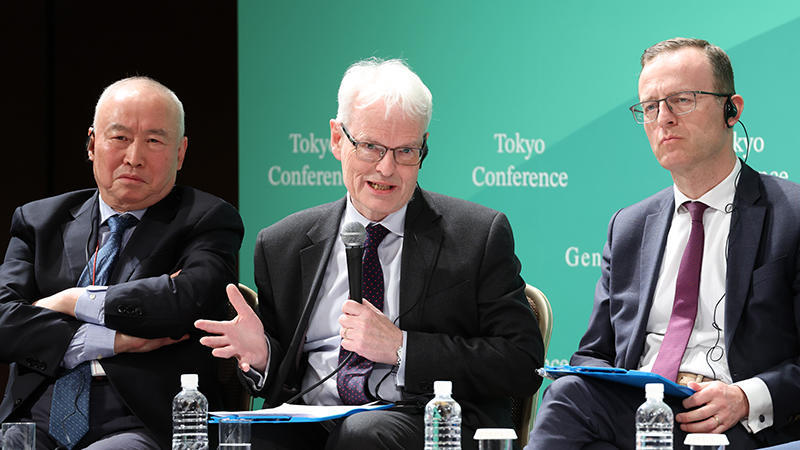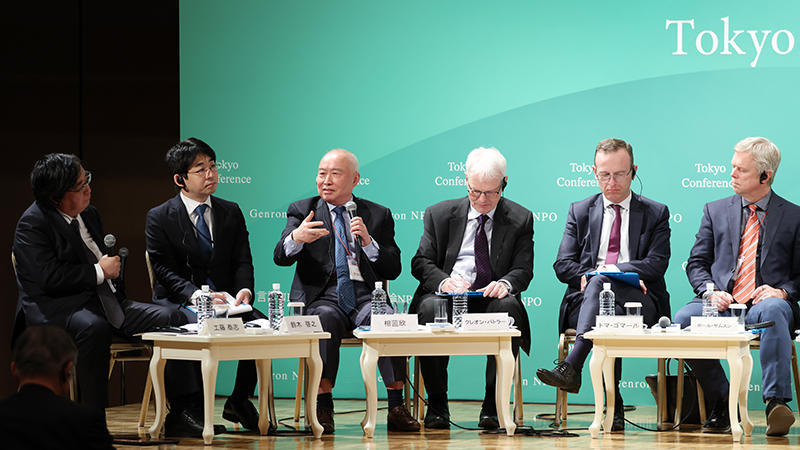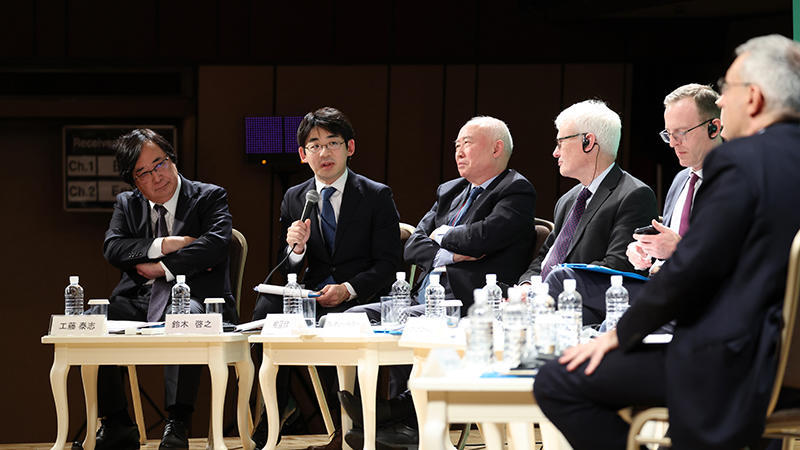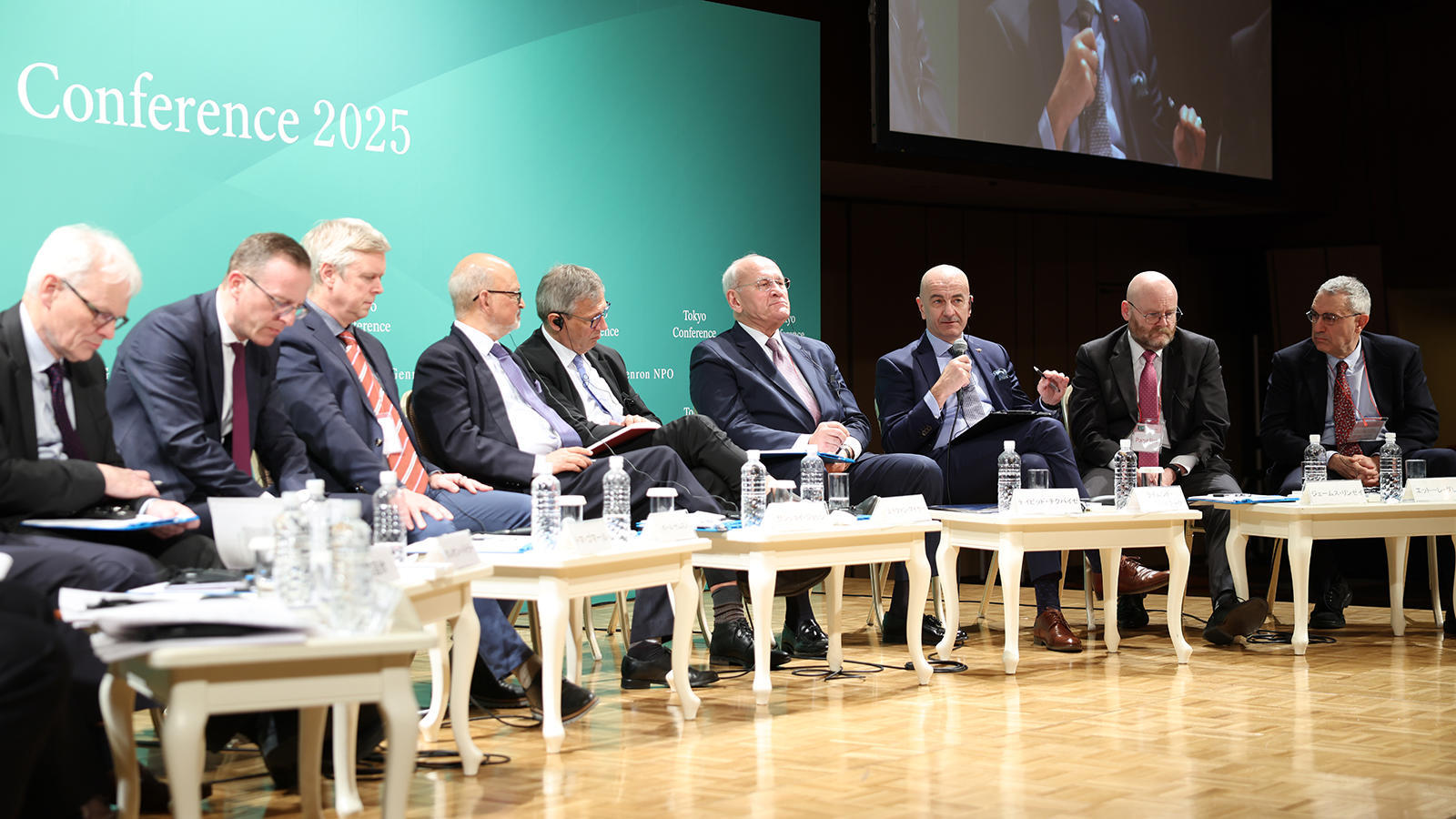The discussions in Session 2 of the Tokyo Conference Open Forum primarily touched upon the difficulties surrounding achieving a ceasefire in Ukraine and re-constructing Gaza. This report covers some of the primary points made about the Ukraine War and briefly addresses the Gaza situation. For a more thorough summary, please see the Japanese version.
James Lindsay of the Council on Foreign Relations opened the session by addressing what he believes is the current policy objective of the US when it comes to the Ukraine War.
"His main objective is very clear in that he's seeking a...reset of US relations with Russia," Lindsay began. "He is not seeking the restoration of all of the territory that Ukraine has lost since 2014. He is not seeking reparations and he is not looking to provide a US security guarantee. (The Trump administration) has argued that that Ukraine needs to compensate the United States for the amount of money it has invested in the war effort over the past three years. President Trump has regularly exaggerated that number."
Lindsay called the ceasefire proposal, which would include US control over Ukrainian resources, as "built on sand" as there is little verifiable knowledge about the types and amounts of minerals to be found in Ukraine. He also criticized Trump's argument that a security guarantee is unnecessary because having an economic agreement in place will deter Russia from resuming hostilities, saying, "The presence of American investments in Ukraine or in Russia did not prevent the Russians from invading in 2014 or again in 2022."
Later in the discussion, session moderator Yasushi Kudo (The Genron NPO) asked Lindsay to clarify his stance on ceasefire negotiations with only Russia at table.
"The belief is that working on a deal with Russia, the benefits that would come from that would swamp any sort of things lost by agreeing to some ceasefire," Lindsay responded.
"I think it's easy to understand why both the Ukrainians and European countries would object to decisions being reached about issues that profoundly affect their security interests by Moscow and the United States."
Ukraine security guarantees are essential, but who will provide them when bilateral agreements and the 'coalition of the willing' cannot?
Stefan Mair (German Institute for International and Security Affairs) provided a German perspective of the situation.
"Perhaps we have a ceasefire, but after the decision made by Donald Trump, we might also end with a dictated peace or unconditional surrender in Ukraine, and this would have catastrophic effects on European security," Mair explained. His concern is that a ceasefire achieved in this way will "encourage other authoritarian leaders to resort to military ambitions and invade other countries because...nobody will hinder them from doing so."
Mair explained that Ukraine security must be addressed in the run-up to a ceasefire.
"Donald Trump has excluded Ukraine from joining NATO. And I must admit that Europeans didn't have a consensus on that. What is left are security agreements, the bilateral security agreements between Ukraine and 20 countries right now, the coalition of the willing, but I'm quite reluctant to call them guarantees because these are agreements. I think they don't have really high credibility."
Mair believes that it is equally important to define what territory will be controlled by whom post-ceasefire, and the Trump plan based on the present frontline will not be effective.
"The Russian government has openly rejected this idea. There's a lot of talk that countries like China, India, and others should fill the gap, but I don't see that working at the moment. I think this ceasefire is quite complicated just (in terms of) the security guarantees."
Ceasefire negotiations must be based on core principles
David A. Chikvaidze (Former Chef de Cabinet of the Director-General of the United Nations Office at Geneva) reminded the audience of the significance of the war in Ukraine.
"We need to be conscious of the fact that war with the stated aim of destroying another country and people has returned to the European continent. Worse still, this war was initiated by a permanent member of the Security Council, who has special responsibility for peace and security. We are not in a 'World War,' mercifully, but we are certainly in a world at war. The appearance of North Korean troops on the European continent is another dangerous step down this road," Chikvaidze said. "Ending the war in Ukraine needs a mature, open minded, balanced approach, deeply rooted in core principles of statecraft, international human rights law, human decency, and pragmatism. There is a dwindling window of opportunity for a seasoned, determined, and creative diplomacy based on stable judgement and statesman-like approaches to international affairs."
First, ceasefire and rearming; second, restoration of sovereignty; third, medium-to-long term path to EU membership

Creon Butler (Chatham House) described three things that Ukraine needs in order to guarantee its future.
"One is a pause. Ukraine definitely needs a pause to the conflict in order to reconstruct and also to rebuild its army, to develop its defense industries, and so on. Secondly, it needs to preserve its sovereignty. What is completely unacceptable is for the US to be able to depose the duly-elected Ukrainian president. And finally, Ukraine needs a medium-to-long-term economic track for EU accession, both in terms of governance and in terms of economic development. Although this is potentially costly to the EU, in the long term this could be an extremely good deal for the EU in the same way as Poland was an extremely good deal for the EU. Ukraine (must move) fast enough in terms of developing its own defense capabilities with the support of the EU so that it is able actually to become sufficiently strong that Russia doesn't want to have another go."
Butler also praised the developments that occurred in Ukraine after the annexation of Crimea.
"If you look at the period from 2014 to 2022, it was quite remarkable what the Ukrainians achieved in circumstances that weren't very politically positive, in terms of domestic reforms, health service reform, financial reform, and strengthening the army, enough actually to resist Putin's first attack. Given that opportunity to rebuild their society, their economy to do the things they need to do, to become sufficiently strong that Russia won't have another go, it's certainly a possibility, and the EU needs to think how it can sustain that."
Peace talks can only begin after a settlement
Rizal Sukma (Centre for Strategic and International Studies, Jakarta) explained that the prevailing opinion in his own country of Indonesia regarding the war in Ukraine is similar to that of the US, namely, that it is not in their best interests to get involved. Sukma feels that Ukraine and Europe as a whole should "resolve this problem in their own backyard."
That being said, Sukma stands against the invasion itself.
"I think Indonesia and a few other countries within South Asia have a stance that is very clear. The invasion of another sovereign state is not acceptable. It's against international law, and is against any international norms enshrined in the UN Charter."
Sukma also expressed strong concerns about the recent European-led resolution condemning Russia as the aggressor in the Ukraine War, a resolution that the US voted against, along with Russia, North Korea, Israel, and other countries.
"How we recognize and respect the international law, respect the international norms, and then respect the international principle has been turned upside down," he said, before concluding that, "Any peace talks can start only after there is a settlement."
Russia already at war with Europe - What is Europe willing to do to ensure its security?
Thomas Gomart (French Institute of International Relations) provided another European perspective of the current situation.
"First of all, Europe is not at war with Russia, whereas Russia is at war with Europe," he said, referring to not only the invasion of Ukraine, but also to Russia-linked "hybrid attacks" in other European countries, including cyberattacks on France in the run-up to the Olympic Games.
"Why does Putin want to destroy Ukraine?" Gomart continued. "First, to achieve so-called 'denazification and demilitarization.' Second, he wants to cut transatlantic relations. And third, he wants to extend Russian influence in Europe, to defeat Europe symbolically. Europeans want to be at the table when European security is the topic. I think that's reasonable."
Gomart believes that issues remain on the European side, noting that the extent to which Europeans are willing to produce their own security, and to propose security guarantees to Ukraine, is still unknown.
"The debate is difficult, because you have some countries which do think that it's possible for Europeans to act by themselves, backed by the US to some extent. France and the UK are clearly on this line. Other countries are very cautious and it is understandable, but at the end of the day, if there is no support or security guarantees provided to Ukraine, if Zelenskyy is killed, or if there is election with a puppet from Moscow, I think that Europeans should prepare themselves for the next phase. It won't stop at Ukraine."
Three wars being fought in Ukraine, and diplomacy is the only answer
Sunjoy Joshi (Observer Research Foundation) argued that the situation in Ukraine is more complex than previously described.
"The problem always has been that three separate wars are being fought in Ukraine," he said. "The first war is about the Russian aggression of a sovereign nation. The second war is about the security architecture of Europe, about Europe, European rivalries and fears which are a hangover of the Second World War. The third war is the war about resetting the global international order. The second and third wars are far too large a burden for the innocent people of Ukraine to carry...these wars have to be negotiated differently."
With this in mind, Joshi was critical about current attitudes toward the war.
"There has to be separate conversations regarding the security architecture of Europe. Europe will have to settle it by different means. Do not push Ukrainians into this meat grinder. It is reprehensible," Joshi said. "How peace has to come to Ukraine has to be rethought. For all the three wars, we need to get back at the table and stop sacrificing Ukrainian lives. It is going to be diplomacy that is going to sort it, not war."
West has "mismanaged" Europe since Cold War, NATO expansion at root of Ukraine War

Lanxin Xiang (Geneva Graduate Institute) spoke about the necessity of having a mutual understanding of the causes of the war before being able to find a way to stop it.
"You cannot have a serious solution unless both sides come to some kind of consensus. You cannot end the war without knowing how the war started," Xiang argued, before stating his belief that the issue is a larger structural one.
"From a Chinese perspective, this is a complete failure on the part of the western world. It is a mismanagement of the post-Cold-War 'ecumenical peace.' Somehow, after the end of Cold War, ideology became very insignificant."
Xiang believes that Putin is attempting to, "remove ideological elements" from current great power relations, and countries must attempt to see the situation from the Russian perspective - i.e., that Ukrainian membership in NATO results in a power imbalance.
"You want Russia to integrate somehow with Western European culture, but you reject Western European culture. That's the Westphalian basic principle of great power relationships based on a balance of power," Xiang said. "Putin says, 'You have stepped on my red line so many times and you ignore Russia completely.' In that sense, I think Putin has a point."
Xiang then provided a few proposals for managing a ceasefire in Ukraine.
"One I would say is the Panmunjom approach. In practical terms, you have a demilitarized zone. The Kashmir (approach would be one that resembles how) India and Pakistan have instituted a line of control. Or you have a Cyprus approach with UN peacekeeping. I think the Panmunjom approach and the UN approach are the best."
Only way forward may be bringing Ukraine into the EU
Paul Samson (Centre for International Governance Innovation) argued that a precondition of achieving peace in Ukraine is for Russia to not win.
"Russia has lost half a million troops. It hasn't got what it wanted. I don't see how Russia would come out thinking it got a win for sure," he said, and noted that to prevent another invasion, security guarantees must be put in place. The only way forward is, "if the European Union, or European countries and the UK, mobilize a common defense as a result of this, with or without some kind of security guarantee in the background. Not NATO membership for Ukraine, but perhaps EU membership."
Confusion within NATO, and possibility that both Russia and Ukraine refuse to accept Trump peace plan
Retired General Rajmund Andrzejczak (Former Chief of the General Staff of the Polish Armed Forces) described NATO as being in a state of confusion, contrasting NATO'S 2010 Strategic Concept, which placed Russia as a "partner," with the 2022 Strategic Concept which described Russia as a "threat." He explained that this confusion was aggravated this year.
"NATO is based on the principles of (combatting the threat of) Russia, and we see the biggest security provider going to the table criticizing Ukraine. Even in the UN Security Council there was no single word about Russia being the aggressor," Andrzejczak said. "The probable short-term tactical objectives of President Trump are to do...a reverse Kissinger. Keep the Russians closer, far away from China, and build a bigger potential in confrontation. That missing strategical perspective is the big confusion."
Andrzejczak described the current Russian perspective by providing an explanation of how victory in war is generally determined, and stating that Russia has yet to fulfill any of those conditions.
"(Clausewitz described) three conditions to win a war and to call victory. First is to seize terrain.
Second is to destroy the enemy's army. The third one is to break the will of the enemy nation. Look at this from the Russian perspective. Okay, have they seized the entire Ukraine? It's only 20%. It's a lot, of course, because they have important infrastructure and also resources, but it's only 20%. Next, is the Ukrainian army broken? I don't think so. And is the Ukrainian nation's will broken?"
Regarding Trump's peace plan, Andrzejczak explained that achieving peace requires all parties to agree to honor the plan, and he does not believe Russia is committed to peace.
"Do we believe the Russians really need and want peace and a ceasefire? I'm not sure. Let's think the unthinkable. What happens the very next day (after a ceasefire is signed between only the US and Russia) if Zelenskyy says 'I don't want to stop. I'm going to fight. That's my national obligation. I've got potential. I've got an ammunition. I've got the European Union support.'
The impact of such an eventuality will be felt far from Europe, Andrzejczak believes.
"The side effect, which is very bad for everybody from Western civilization, will be the perception of the US as an unable and ineffective negotiator, and will be definitely used by Russian propaganda the very next day."
Addressing the Gaza issue

The discussion turned to Gaza, and Hiroyuki Suzuki (University of Tokyo) criticized the Trump administration's proposal to forcibly locate Palestinians outside of Gaza while the US takes possession of the Gaza strip.
"This solution will only result in a yet another Palestine problem," Suzuki said. "Reconstruction can only take place when the residents of Gaza are in Gaza. An organization with no ties to the US, Israel, or its allies is needed, one that can act as a third-party mediator. However, Israel's dislike of the UN and Trump's distrust of it are preventing the UN from filling that role."
Suzuki is concerned that, "While the organizational strength of the United Nations has never been as fragile as it is now, the United Nations has never been as needed."
He also described that the situation is difficult for Japan as an ally of the US.
"How should Japan, a US ally and liberal democracy itself, respond to repeated US proposals that are clearly unacceptable when considered from a liberal perspective?" he asked. "This is one of the more difficult points to consider."

Post a comment